Sir John Monash, Personal Files Book 5, 25 May - 10 June 1915, Part 5
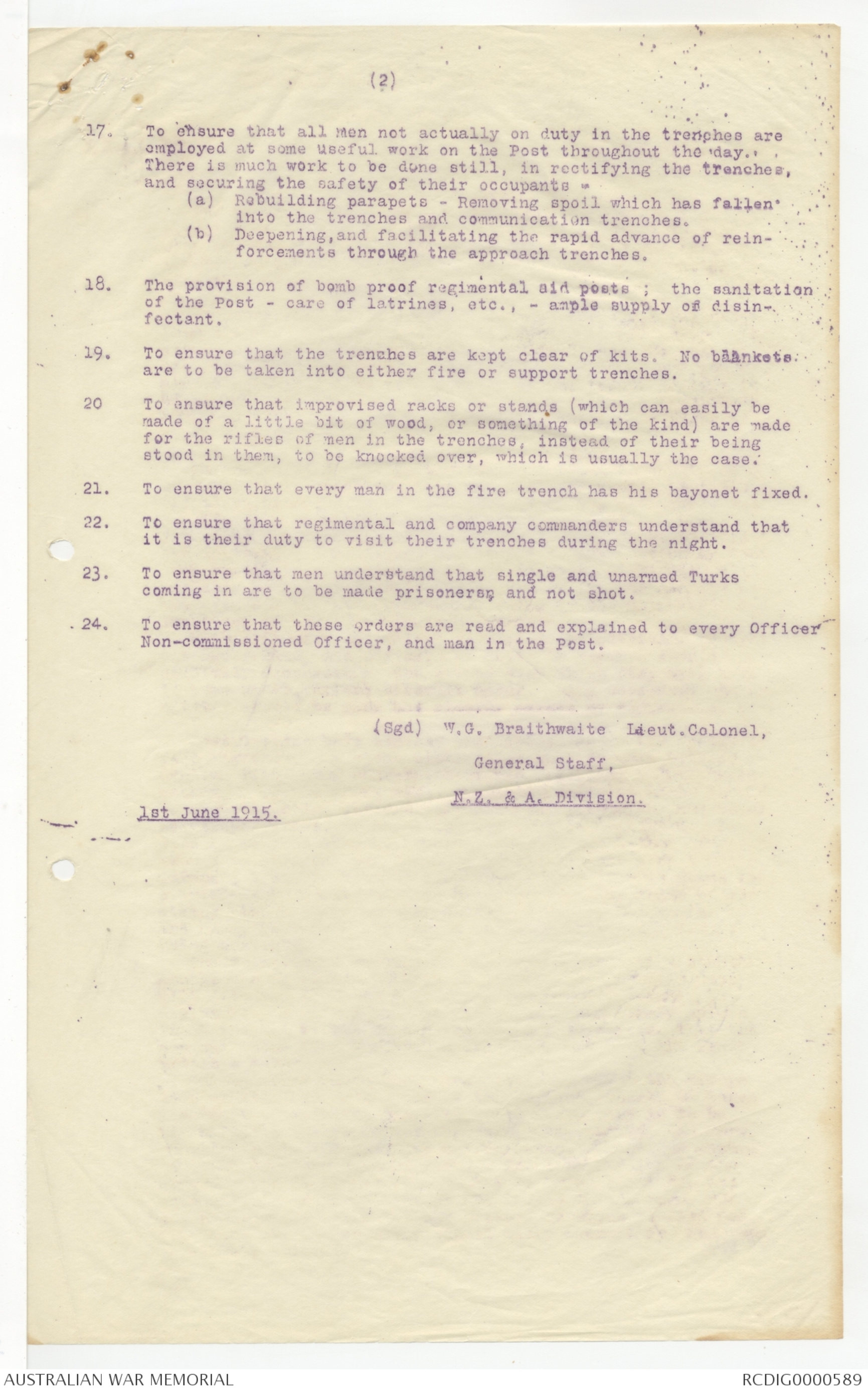
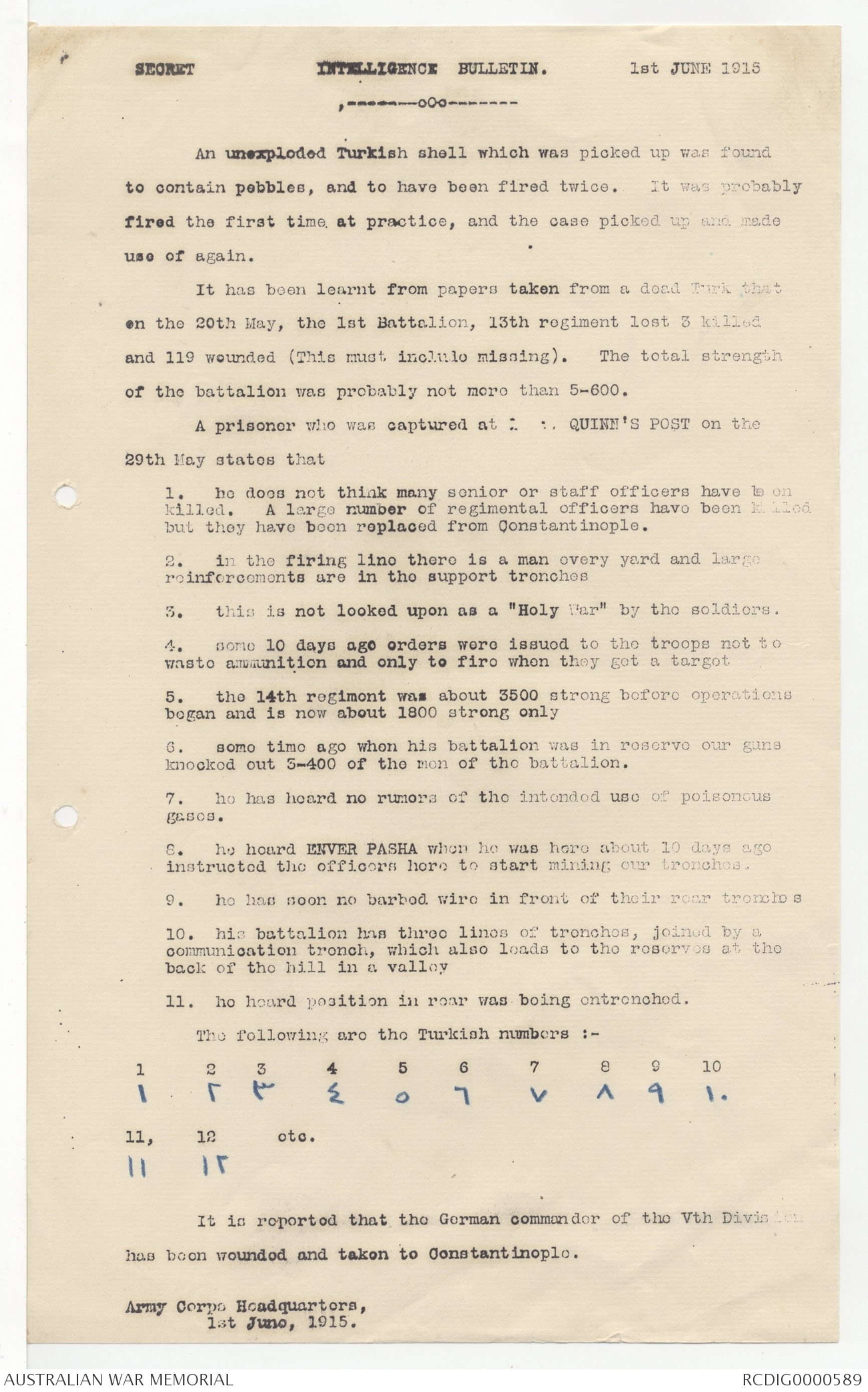
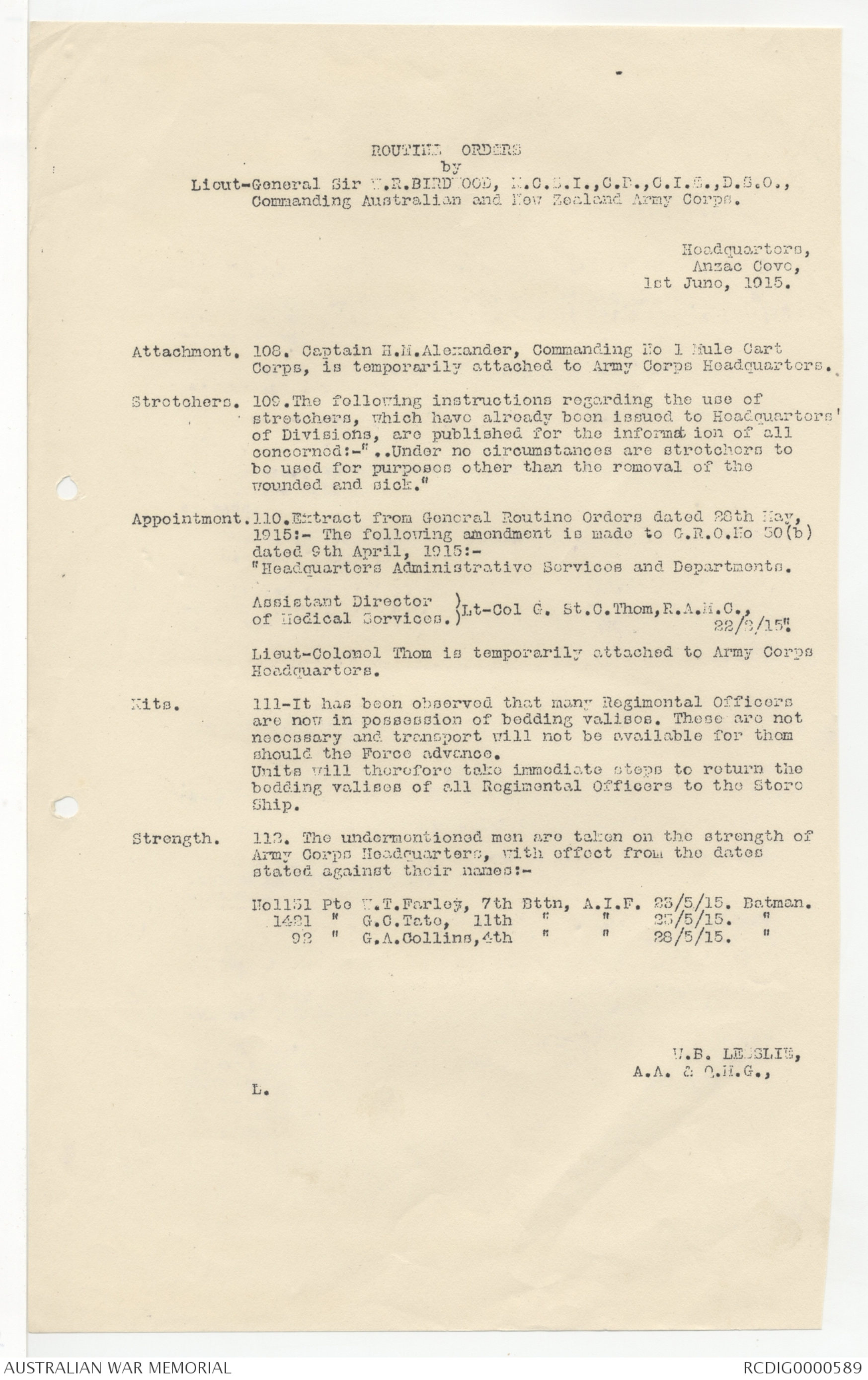
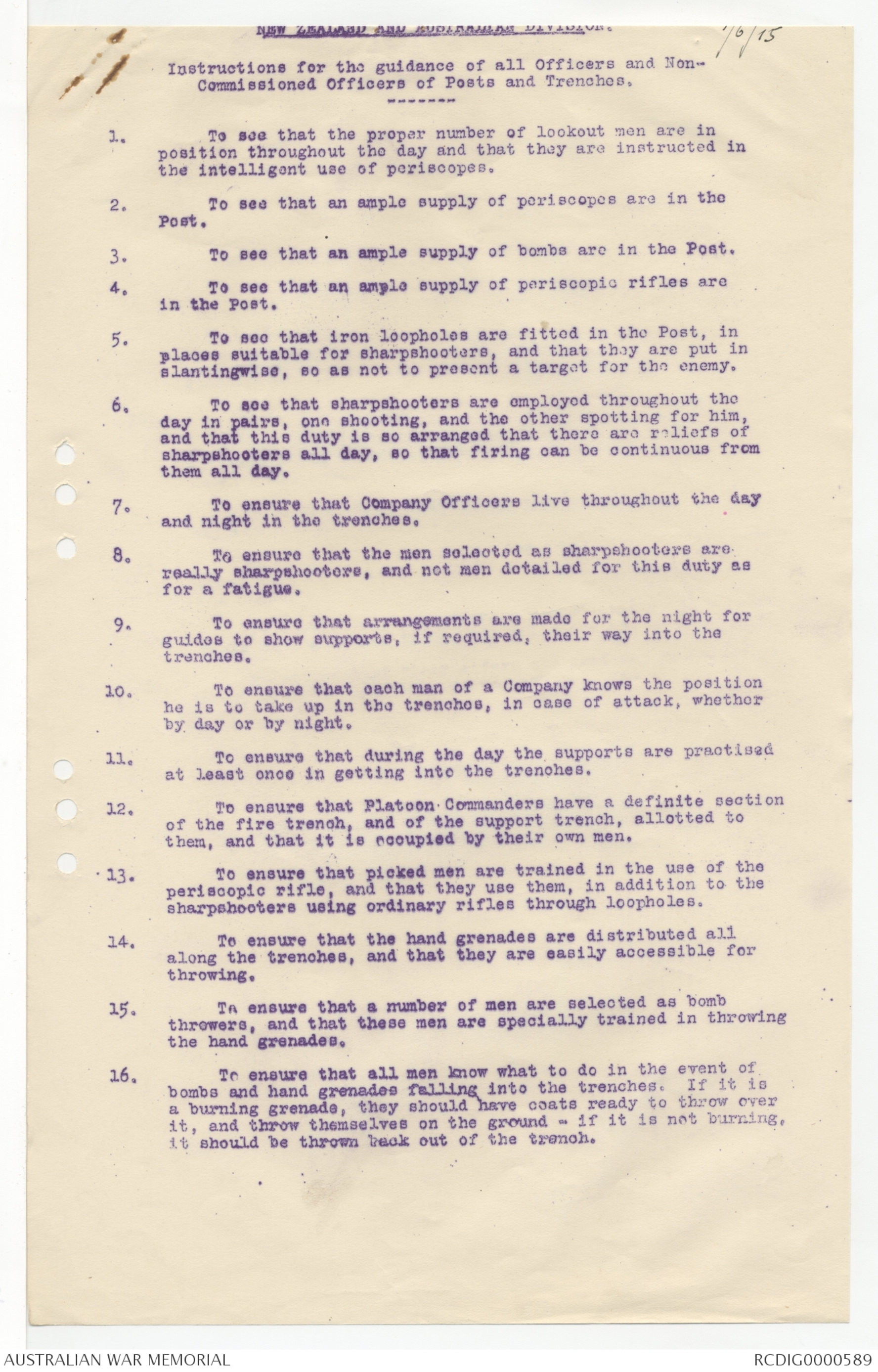
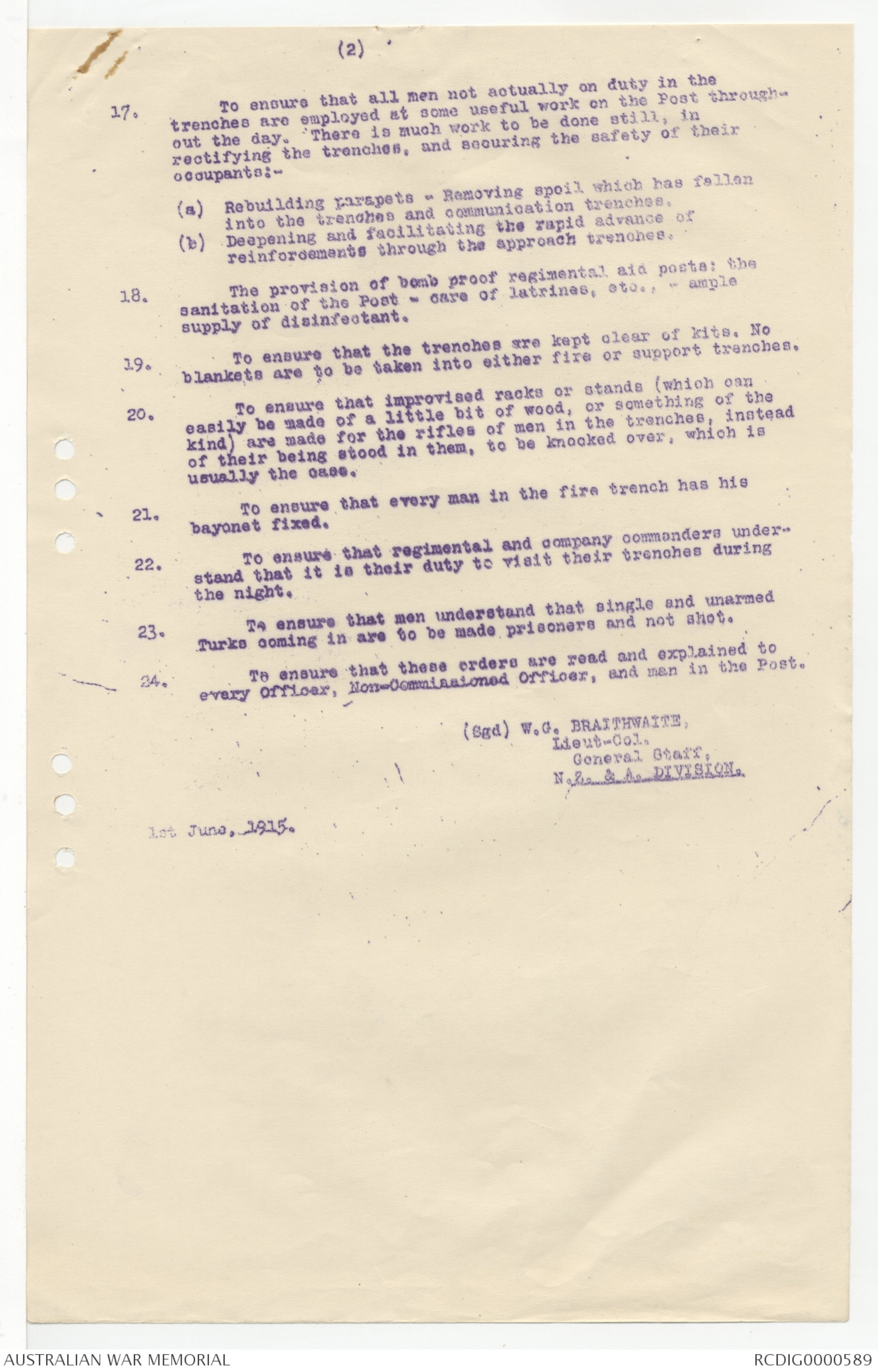
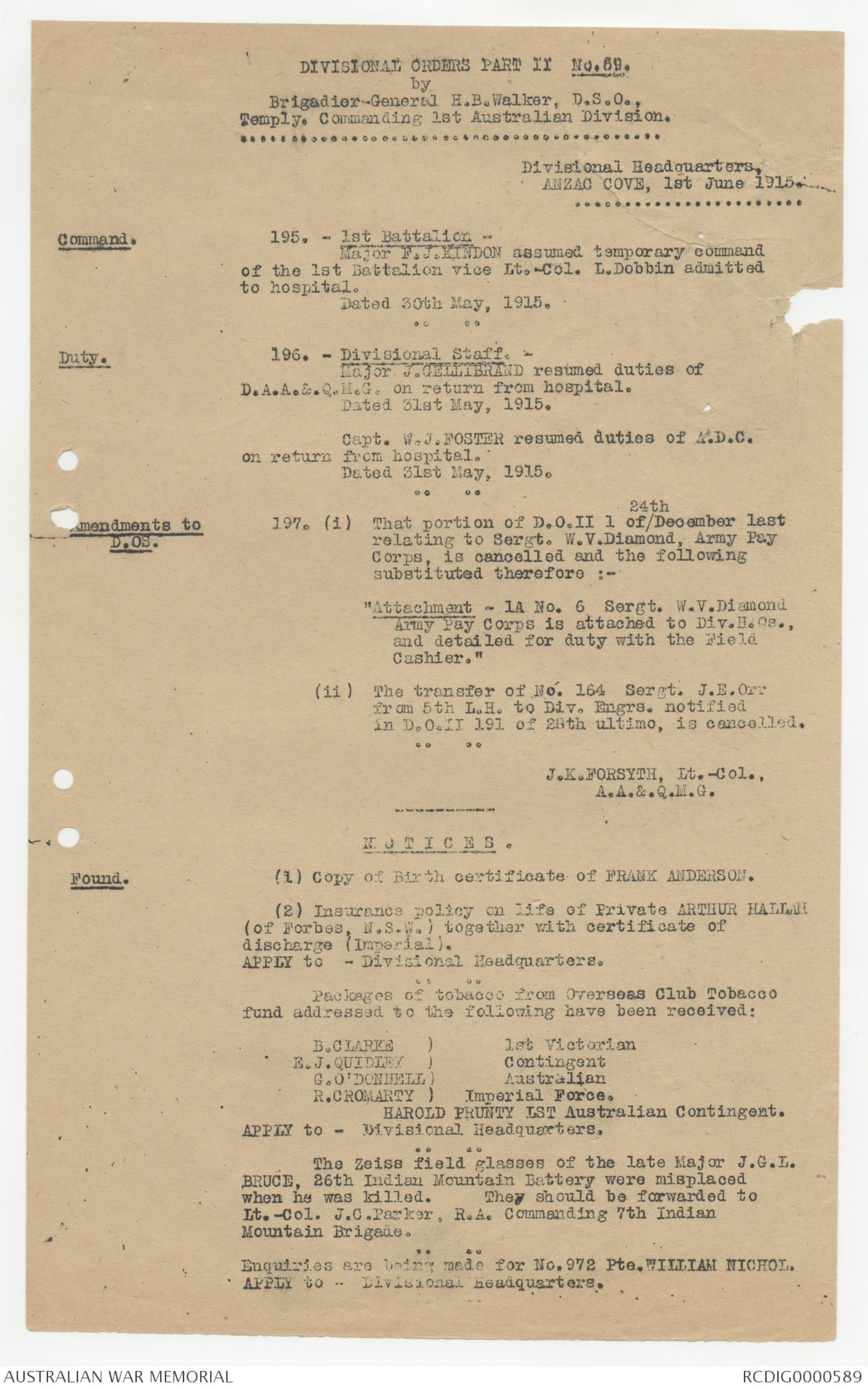
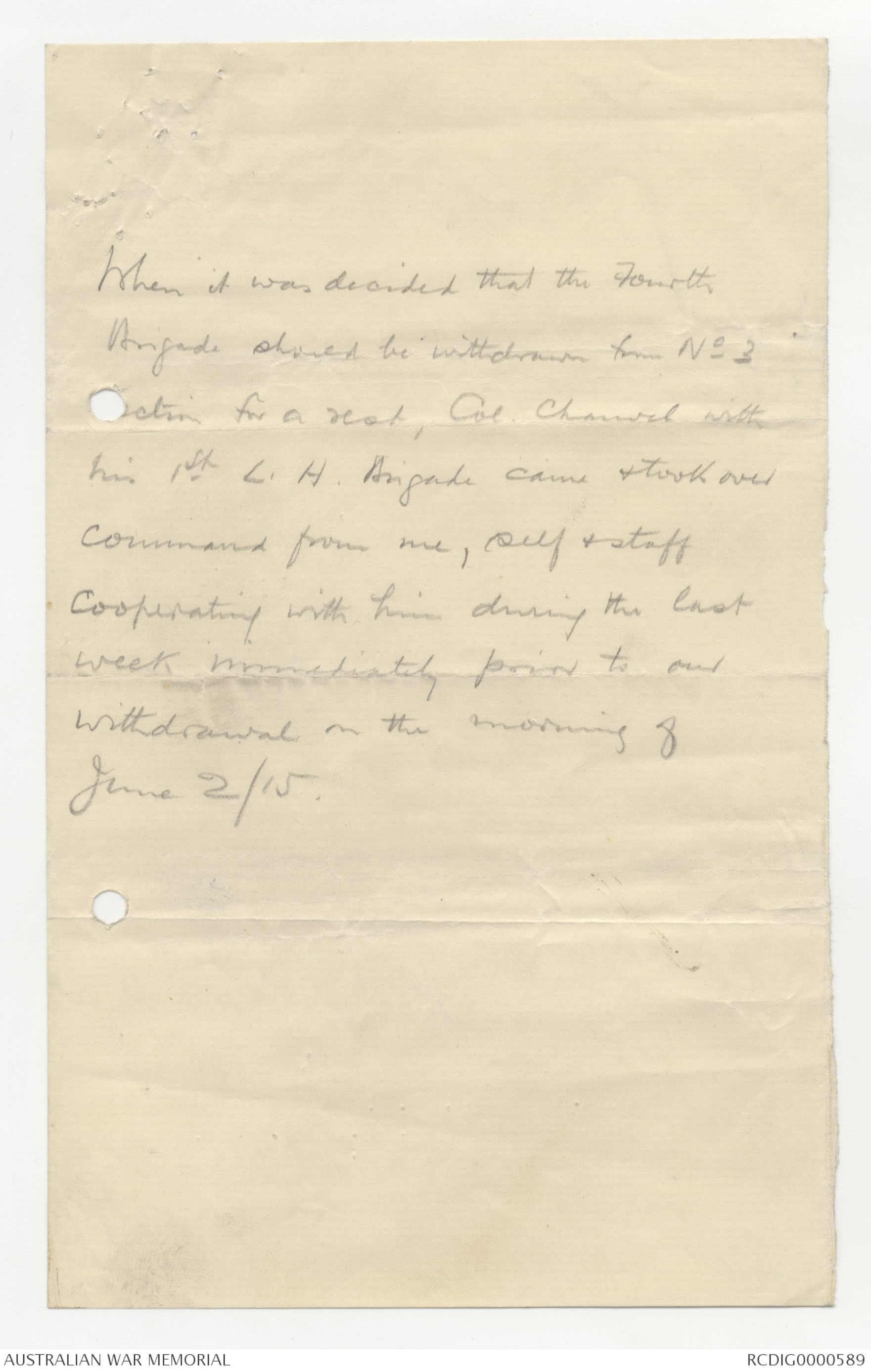
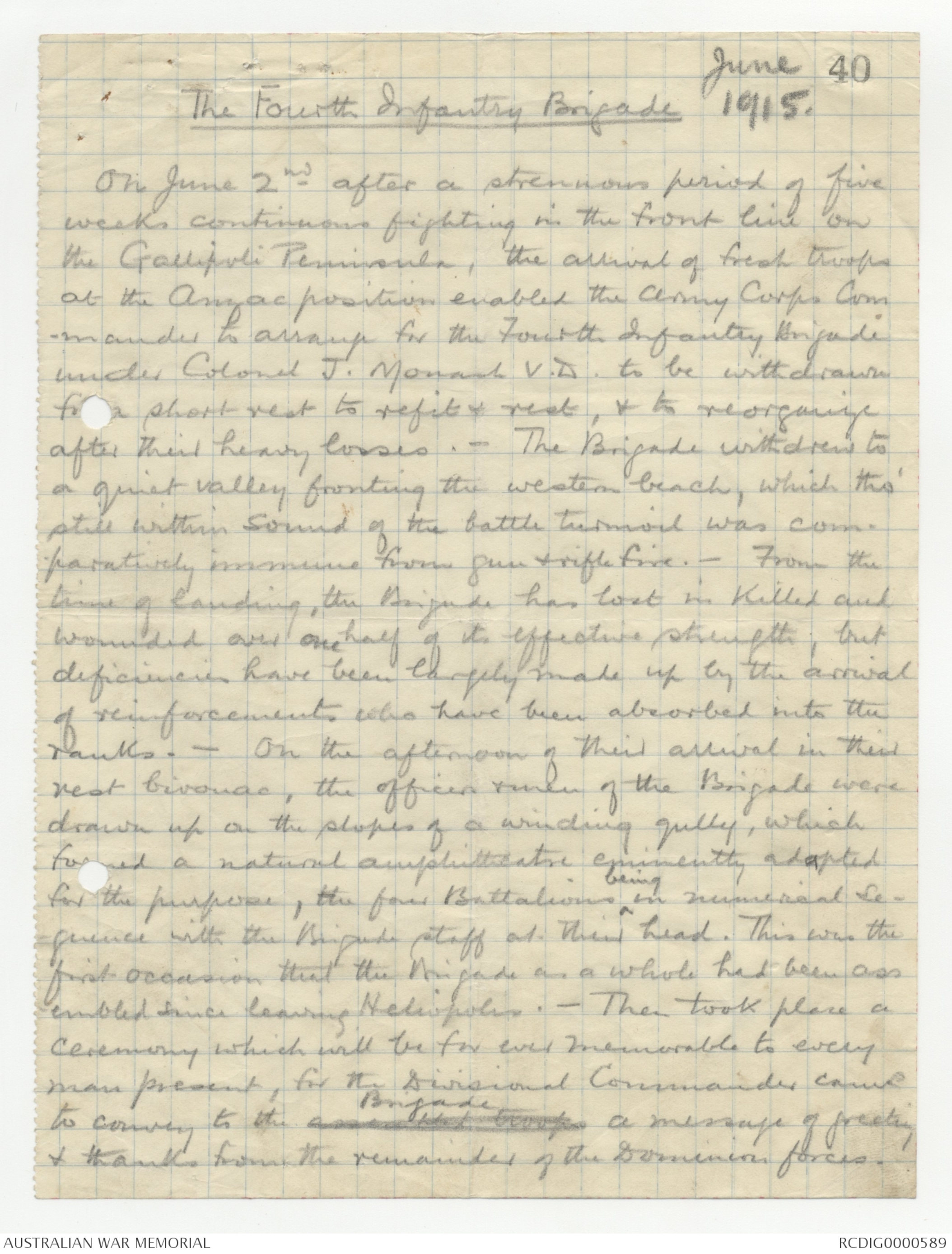
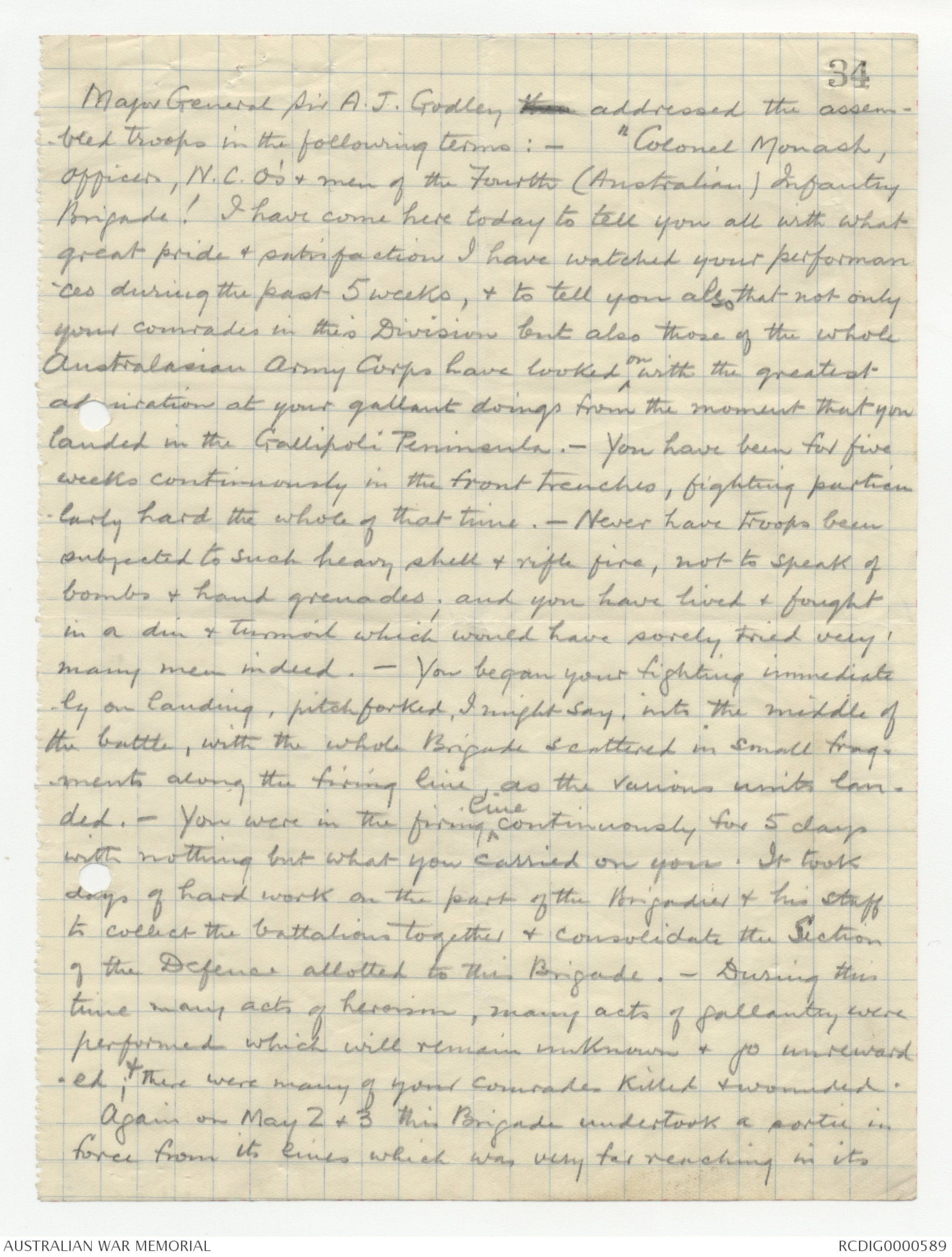
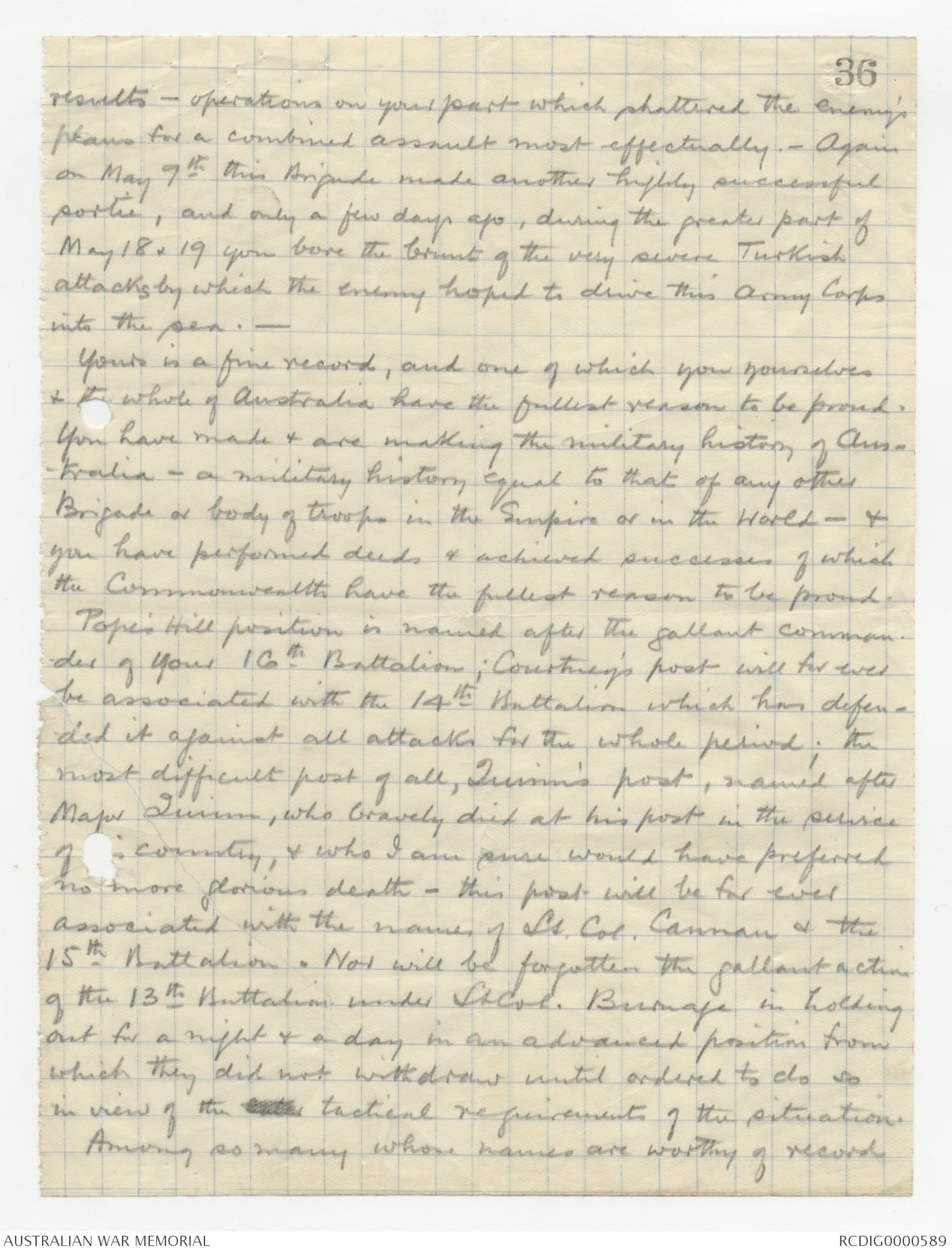
(2)
17. To ensure that all men not actually on duty in the trenches are
employed at some useful work on the Post throughout the day.
There is much work to be done still, in rectifying the trenches,
and securing the safety of their occupants -
(a) Rebuilding parapets - Removing spoil which has fallen
into the trenches and communication trenches.
(b) Deepening, and facilitating the rapid advance of reinforcements
through the approach trenches.
18. The provision of bomb proof regimental aid posts; the sanitation
of the Post - care of latrines, etc., - ample supply of disinfectant.
19. To ensure that the trenches are kept clear of kits. No blankets
are to be taken into either fire or support trenches.
20. To ensure that improvised racks or stands (which can easily be
made of a little bit of wood, or something of the kind) are made
for the rifles of men in the trenches, instead of their being
stood in them, to be knocked over, which is usually the case.
21. To ensure that every man in the fire trench has his bayonet fixed.
22. To ensure that regimental and company commanders understand that
it is their duty to visit their trenches during the night.
23. To ensure that men understand that single and unarmed Turks
coming in are to be made prisoners and not shot.
24. To ensure that these orders are read and explained to every Officer
Non-commissioned officer, and man in the Post.
(Sgd) W.G. Braithwaite Lieut. Colonel,
General Staff,
N.Z. & A. Division.
1st June 1915.
SECRET INTELLIGENCE BULLETIN. 1st JUNE 1915
An unexploded Turkish shell which was picked up was found
to contain pebbles, and to have been fired twice. It was probably
fired the first time at practice, and the case picked up and made
use of again.
It has been learnt from papers taken from a dead Turk that
on the 20th May, the 1st Battalion, 13th regiment lost 3 killed
and 119 wounded (This must include missing). The total strength
of the battalion was probably not more than 5-600.
A prisoner who was captured at XXX QUINN'S POST on the
29th May states that
1. he does not think many senior or staff officers have been
killed. A large number of regimental officers have been killed
but they have been replaced from Constantinople.
2. in the firing line there is a man every yard and large
reinforcements are in the support trenches
3. this is not looked upon as a "Holy War" by the soldiers.
4. some 10 days ago orders were issued to the troops not to
waste ammunition and only to fire when they got a target
5. the 14th regiment was about 3500 strong before operations
began and is now about 1800 strong only
6. some time ago when his battalion was in reserve our guns
knocked out 5-400 of the men of the battalion.
7. he has heard no rumors of the intended use of poisonous
gases.
8. he heard ENVER PASHA when he was here about 10 days ago
instructed the officers here to start mining our trenches.
9. he has seen no barbed wire in front of their rear trenches
10. his battalion has three lines of trenches, joined by a
communication trench, which also leads to the reserves at the
back of the hill in a valley
11. he heard position in rear was being entrenched.
The Following are the Turkish numbers :-
1 2 3 4 5 6 7 8 9 10
l ? ? ∑ o 7 v ∧ 9 1.
11, 12 etc.
ll l?
It is reported that the German commander of the Vth Division
has been wounded and taken to Constantinople.
Army Corps Headquarters,
1st June, 1915.
ROUTINE ORDERS
by
Lieut-General Sir W.R.BIRDWOOD, N.C.S.I,C.P.,C.I.S.,D.S.O.,
Commanding Australian and New Zealand Army Corps.
Headquarters,
Anzac Cove,
1st June, 1915.
Attachment. 108. Captain H.M.Alexander, Commanding No 1 Mule Cart
Corps, is temporarily attached to Army Corps Headquarters.
Stretchers. 109. The following instructions regarding the use of
stretchers, which have already been issued to Headquarters'
of Divisions, are published for the information of all
concerned :- "..Under no circumstances are stretchers to
be used for purposes other than the removal of the
wounded and sick."
Appointment. 110. Extract from General Routine Orders dated 28th May,
1915:- The following amendment is made to G.R.O.No 50 (b)
dated 9th April, 1915:-
"Headquarters Administrative Services and Departments.
Assistant Director }
of Medical Services.} Lt-Col G. St.C.Thom,R.A.M.C..
22/2/15"
Lieut-Colonel Thom is temporarily attached to Army Corps
Headquarters.
Kits. 111-1t has been observed that many Regimental Officers
are now in possession of bedding valises. These are not
necessary and transport will not be available for them
should the Force advance.
Units will therefore take immediate steps to return the
bedding valises of all Regimental Officers to the Store
Ship.
Strength. 112. The undermentioned men are taken on the strength
of Army Corps Headquarters, with effect from the dates
stated against their names:-
No 1151 Pte W.T.Farley, 7th Bttn, A.I.F. 25/5/15. Batman
1421 " G.C.Tate, 11th " " 25/5/15. "
92 " G.A. Collins, 4th " " 28/5/15. "
W.B. LESSLIE,
A.A. &. Q.H.G.,
L.
for a fatigue.
9. To ensure that arrangements are made for the night for
guides to show supports, if required, their way into the
trenches.
10. To ensure that each man of a Company knows the position
he is to take up in the trenches, in case of attack, whether
by day or by night.
11. To ensure that during the day the supports are practised
at least once in getting into the trenches.
12. To ensure that Platoon Commanders have a definite section
of the fire trench, and of the support trench, allotted to
them, and that it is occupied by their own men.
13. To ensure that picked men are trained in the use of the
periscopic rifle, and that they use them, in addition to the
sharpshooters using ordinary rifles through loopholes.
14. To ensure that the hand grenades are distributed all
along the trenches, and that they are easily accessible for
throwing.
15. To ensure that a number of men are selected as bomb
throwers, and that these men are specially trained in throwing
the hand grenades.
16. To ensure that all men know what to do in the event of
bombs and hand grenades falling into the trenches. If it is
a burning grenade, they should have coats ready to throw over
it and throw themselves on the ground - if it is not burning,
it should be thrown back out of the trench.
(2)
17. To ensure that all men not actually on duty in the
trenches are employed at some useful work on the Post
throughout the day. There is much work to be done still, in
rectifying the trenches, and securing the safety of their
occupants:-
(a) Rebuilding parapets - Removing spoil which has fallen
into the trenches and communication trenches.
(b Deepening and facilitating the rapid advance of
reinforcements through the approach trenches.
18. The provision of bomb proof regimental aid posts: the
sanitation of the Post - care of latrines, etc., - ample
supply or disinfectant.
19. To ensure that the trenches are kept clear of kits. No
blankets are to be taken into either fire or support trenches.
20. To ensure that improvised racks or stands (which can
easily be made of a little bit of wood, or something of
the kind) are made for the rifles of men in the trenches, instead
of their being stood in them, to be knocked over, which is
usually the case.
21. To ensure that every man in the fire trench has his
bayonet fixed.
22. To ensure that regimental and company commanders understand
that it is their duty to visit their trenches during
the night.
23. To ensure that men understand that single and unarmed
Turks coming in are to be made prisoners and not shot.
24. To ensure that these orders are read and explained to
every Officer, Non-Commissioned Officer, and man in the Post.
(Sgd) W.G. BRAITHWAITE,
Lieut-Col.
General Staff
N.Z. & A. DIVISION.
1st June, 1915.
DIVISIONAL ORDERS PART ll No.69.
by
Brigadier-General H.B. Walker, D.S.O.,
Temply. Commanding 1st Australian Division.
Divisional Headquarters
ANZAC COVE, lst June 1915.
Command. 195. - Ist Battalion -
Major F.J. KINDON assumed temporary command
of the 1st Battalion vice Lt.-Col. L.Dobbin admitted
to hospital.
Dated 30th May, 1915.
Duty. 196. - Divisional Staff. -
Major J.GELLLIBRAND resumed duties of
D.A.A.&.Q.M.G. on return from hospital.
Dated 3lst May, 1915.
Capt. W.J.FOSTER resumed duties of A.D.C.
on return from hospital.
Dated 3lst May, 1915.
Amendments to
D.OS. 197. (i) That portion of D.O.II 1 of /24th December last
relating to Sergt. W.V.Diamond, Army Pay
Corps, is cancelled and the following
substituted therefore:-
"Attachment - 1A No. 6 Sergt. W.V.Diamond
Army Pay Corps is attached to Div.H.Qs.,
and detailed for duty with the Field
Cashier."
(ii) The transfer of No. 164 Sergt. J.E.Orr
from 5th L.H. to Div. Engrs. Notified
in D.O.II 191 of 28th ultimo, is cancelled.
J.K.FORSYTH, Lt.-Col.,
A.A.&.Q.M.G.
NOTICES.
Found. (1) Copy of Birth certificate of FRANK ANDERSON.
(2) Insurance policy on life of Private ARTHUR HALLAN
(of Forbes, N.S.W.) together with certificate of
discharge (Imperial).
APPLY to - Divisional Headquarters.
Packages of tobacco from Overseas Club Tobacco
fund addressed to the following have been received:
B.CLARKE) Ist Victorian
E.J.QUIDLEY) Contingent
G.O'DONNELL) Australian
R.CROMARTY) Imperial Force.
HAROLD PRUNTY LST Australian Contingent.
APPLY to - Divisional Headquarters.
The Zeiss field glasses of the late Major J.G.L.
BRUCE, 26th Indian Mountain Battery were misplaced
when he was killed. They should be forwarded to
Lt. -Col. J.C.Parker, R.A. Commanding 7th Indian
Mountain Brigade.
Enquiries are being made for No. 972 Pte. WILLAM NICHOL.
APPLY to . Divisional Headquarters.
When it was decided that the Fourth
Brigade should be withdrawn from No 3
section for a rest, Col. Chauvel with
his 1st L. H. Brigade came & took over
command from me, self & staff
Cooperating with him during the last
week immediately prior to our
withdrawal on the morning of
June 2/15.
June 1915. 40
The Fourth Infantry Brigade
On June 2nd after a strenuous period of five
weeks continuous fighting in the front line on
the Gallipoli Peninsula, the arrival of fresh troops
at the Anzac position enabled the Army Corps
Commander to arrange for the Fourth Infantry Brigade
under Colonel J. Monash V.D. to be withdrawn
for a short rest to refit & rest, & to reorganize
after their heavy losses. - The Brigade withdrew to
a quiet valley fronting the western beach, which tho'
still within sound of the battle turmoil was comparatively
immune from gun & rifle fire. - From the
time of landing, the Brigade has lost in Killed and
Wounded over one half of its effective strength, but
deficiencies have been largely made up by the arrival
of reinforcements who have been absorbed into the
ranks. - On the afternoon of their arrival in their
rest bivouac, the officers & men of the Brigade were
drawn up on the slopes of a winding gully, which
formed a natural amphitheatre eminently adapted
for the purpose, the four Battalions ∧being in numerical sequence
with the Brigade staff at their head. This was the
first occasion that the Brigade as a whole had been
assembled since leaving Heliopolis - Then took place a
ceremony which will be for ever memorable to every
man present, for the Divisional Commander came
to convey to the assembled troops Brigade a message of greeting
& thanks from the remainder of the Dominion forces.
34
Major General Sir A.J. Godley then addressed the assembled
troops in the following terms: - "Colonel Monash,
Officers, N.C.O's & men of the Fourth (Australian) Infantry
Brigade! I have come here today to tell you all with what
great pride & satisfaction I have watched your performances
during the past 5 weeks, & to tell you also that not only
your comrades in this Division but also those of the whole
Australasian Army Corps have looked ∧on with the greatest
admiration at your gallant doings from the moment that you
landed in the Gallipoli Peninsula.- You have been for five
weeks continuously in the front trenches, fighting particularly
hard the whole of that time. - Never have troops been
subjected to such heavy shell & rifle fire, not to speak of
bombs & hand grenades; and you have lived & fought
in a din & turmoil which would have sorely tried very
many men indeed. - You began your fighting immediately
on landing, pitchforked, I might say, into the middle of
the battle, with the whole Brigade scattered in small fragments
along the firing line, as the various units landed.
- You were in the firing ∧line continuously for 5 days
with nothing but what you carried on you. It took
days of hard work on the part of the Brigadier & his staff
to collect the battalions together & consolidate the Section
of the Defence allotted to this Brigade. - During this
time many acts of heroism, many acts of gallantry were
performed which will remain unknown & go unrewarded;
& there were many of your comrades killed & wounded.
Again on May 2 & 3 this Brigade undertook a sortie in
force from its lines which was very far reaching in its
36
results - operations on your part which shattered the enemy's
plans for a combined assault most effectually. – Again
on May 7th this Brigade made another highly successful
sortie, and only a few days ago, during the greater part of
May 18 & 19 you bore the brunt of the very severe Turkish
attacks by which the enemy hoped to drive this Army Corps
into the sea. –
Yours is a fine record, and one of which you yourselves
& the whole of Australia have the fullest reason to be proud.
You have made & are making the military history of Australia
- a military history equal to that of any other
Brigade or body of troops in the Empire or in the World - &
you have performed deeds & achieved successes of which
the Commonwealth have the fullest reason to be proud.
Pope's Hill position is named after the gallant commander
of your 16th Battalion; Courtney's post will for ever
be associated with the 14th Battalion which has defended
it against all attacks for the whole period; the
most difficult post of all, Quinn's post, named after
Major Quinn, who bravely died at his post in the service
of his country, & who I am sure would have preferred
no more glorious death - this post will be for ever
associated with the names of Lt. Col. Cannan & the
15th Battalion. Nor will be forgotten the gallant action
of the 13th Battalion under Lt Col.. Burnage in holding
out for a night & a day in an advanced position from
which they did not withdraw until ordered to do so
in view of the enter tactical requirements of the situation.
Among so many whose names are worthy of record
 Deb Parkinson
Deb ParkinsonThis transcription item is now locked to you for editing. To release the lock either Save your changes or Cancel.
This lock will be automatically released after 60 minutes of inactivity.